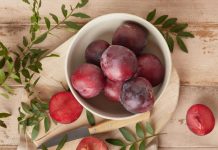
In a study from the University of Aberdeen, scientists found a key factor that can make healthy food more appealing and may help curb cravings for calorific snacks.
The study looked at how ‘readiness-to-eat’ influenced food cravings.
The results showed that instantly edible food was around 15% more appealing than food that needs even the slightest preparation—be it cooked, peeled or even just pulled out of the packet.
This key difference was true of meat, fruit and vegetables, and even chocolate and crisps. Across the board, the results showed that people craved instant edible food more strongly.
So, a peeled orange elicited higher cravings than an unpeeled one and a closed bag of chips brought lower cravings than an open one.
In the study, the team showed more than 200 volunteers images of food in different stages of preparedness and asked them to rate how much they craved it.
For example, a raw piece of salmon was compared to a cooked piece of salmon, and a whole unpeeled pineapple was compared to a chopped pineapple.
The team says there is plenty of research that has shown that higher-calorie foods are linked to higher cravings, so that is already well established.
The interesting thing they found is that food cravings are much higher for instantly edible foods compared to foods that needed to be cooked, chopped or peeled, or even unwrapped.
The biggest difference was for raw compared to cooked foods, followed by unpeeled or packaged compared to peeled or unpackaged food, and finally for chopped and unchopped foods.
The team also found that the hungrier people were, the greater the effect of readiness to eat.
The research should be applied when promoting healthy eating campaigns and suggests that the fast-food industry already capitalizes on this.
It would be more effective if public health services used pictures of ready-to-eat healthy food on their adverts as we now know that this makes it more appealing and more likely to encourage healthy food choices.
If you care about nutrition, please read studies about foods that could improve survival in Parkinson’s disease, and vitamin D supplements strongly reduce cancer death.
For more information about nutrition, please see recent studies about plant nutrient that could help reduce high blood pressure, and these antioxidants could help reduce dementia risk.
The study was conducted by Dr. Constanze Hesse et al and published in the journal Food Quality and Preference.
Copyright © 2023 Knowridge Science Report. All rights reserved.



